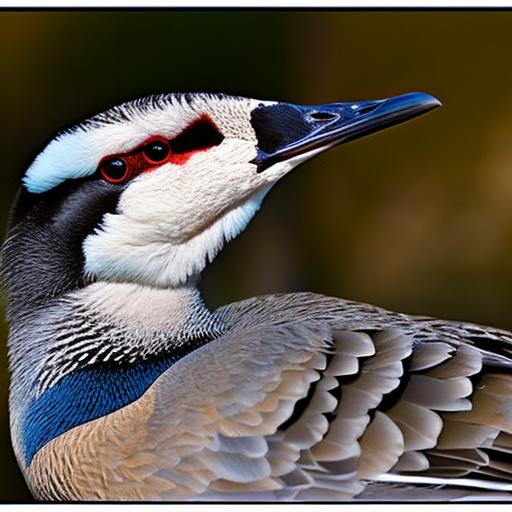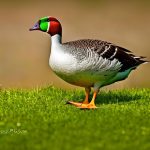Canadian geese are not a typical choice for a pet, but some people do choose to keep them as companions. These large waterfowl are known for their distinctive honking sound and their beautiful markings. While they may not be the most conventional pet, there are several reasons why people choose to keep Canadian geese.
One reason is their beauty. Canadian geese have striking black and white markings on their bodies, with a vibrant orange beak. They are also known for their graceful movements, both on land and in the water. Many people find them visually appealing and enjoy having them as a unique addition to their household.
Another reason people choose to keep Canadian geese as pets is their intelligence and social nature. These birds are highly intelligent and can form strong bonds with their human caretakers. They are also known to be very social animals, often forming close relationships with other geese and even other species of birds. This social nature can make them a rewarding pet for those who are looking for companionship.
Key Takeaways
- Canadian geese can make great pets, but there are legal considerations to keep in mind.
- When choosing a breed and gender, consider factors such as temperament and size.
- Housing and enclosure requirements for Canadian geese include access to water and protection from predators.
- Feeding and nutrition for Canadian geese should include a balanced diet of grains, greens, and protein.
- Health and veterinary care for Canadian geese may include vaccinations and regular check-ups.
Legal Considerations for Owning Canadian Geese
Before considering keeping Canadian geese as pets, it is important to understand the legal considerations involved. In many places, owning Canadian geese as pets is regulated by local laws and regulations. These laws are in place to protect both the geese and the community.
In some areas, owning Canadian geese as pets may require a permit or license. This is to ensure that the owner is knowledgeable about the care and needs of these birds, and that they have the appropriate facilities to house them. It is important to research the specific laws and regulations in your area before bringing home a Canadian goose as a pet.
Choosing the Right Breed and Gender of Canadian Geese
There are several different breeds of Canadian geese, each with their own unique characteristics. Some breeds are larger and more aggressive, while others are smaller and more docile. It is important to choose a breed that fits well with your lifestyle and the environment in which you live.
In addition to choosing the right breed, it is also important to consider the gender of the Canadian geese. Male geese, known as ganders, are typically larger and more aggressive than females, known as geese. If you are looking for a more docile pet, a female goose may be a better choice. However, if you are looking for a larger and more protective pet, a male goose may be a better fit.
Housing and Enclosure Requirements for Canadian Geese
Canadian geese require a large and secure enclosure to live in. They need plenty of space to roam and access to water for swimming. The enclosure should also provide protection from predators and the elements.
Outdoor housing options for Canadian geese include large aviaries or fenced-in areas with access to a pond or other body of water. Indoor housing options can include large pens or converted barns with access to water for swimming. It is important to provide plenty of space for the geese to move around and stretch their wings.
Safety considerations are also important when it comes to housing Canadian geese. The enclosure should be secure and free from any hazards that could harm the geese. This includes ensuring that there are no sharp objects or toxic plants within reach of the geese.
Feeding and Nutrition for Canadian Geese
Canadian geese have specific dietary needs that must be met in order for them to thrive as pets. They require a diet that is high in protein and low in carbohydrates. This can be achieved through a combination of commercial waterfowl feed, fresh fruits and vegetables, and occasional treats.
It is important to provide a balanced diet for Canadian geese, as deficiencies in certain nutrients can lead to health problems. Fresh water should also be available at all times for drinking and swimming.
Feeding schedules and amounts will vary depending on the age and activity level of the geese. It is important to consult with a veterinarian or avian specialist to determine the appropriate feeding regimen for your geese.
Health and Veterinary Care for Canadian Geese

Like any pet, Canadian geese require regular veterinary care to ensure their health and well-being. It is important to find a veterinarian who specializes in avian care, as they will have the knowledge and experience to properly care for your geese.
Regular check-ups are important for monitoring the overall health of the geese and catching any potential health issues early on. Vaccinations may also be recommended to protect against common diseases.
Preventing common health issues in Canadian geese can be achieved through proper nutrition, regular exercise, and a clean living environment. It is important to provide a clean and dry area for the geese to live in, as damp conditions can lead to respiratory problems.
Training and Socializing Canadian Geese
Training and socializing Canadian geese is an important part of responsible ownership. These birds are highly intelligent and can be trained to respond to commands and cues.
Socialization is also important for Canadian geese, as it helps them develop strong bonds with their human caretakers. Spending time with your geese, talking to them, and providing positive reinforcement can help build trust and strengthen the bond between you.
Basic training techniques for Canadian geese include positive reinforcement, repetition, and consistency. It is important to be patient and understanding when working with these birds, as they may take time to learn new commands or behaviors.
Behavioral Characteristics of Canadian Geese
Canadian geese have natural behaviors that are important to understand when keeping them as pets. These birds are migratory by nature, which means they have a strong instinct to travel long distances in search of food and suitable nesting sites.
Understanding and working with these natural behaviors can help prevent behavioral issues in Canadian geese. Providing plenty of space for them to roam and access to water for swimming can help satisfy their natural instincts.
Common behavioral issues in Canadian geese include aggression, territoriality, and excessive noise. These behaviors can be addressed through proper training, socialization, and providing a stimulating environment for the geese.
Challenges of Owning Canadian Geese as Pets
Owning Canadian geese as pets comes with its own set of challenges. These birds require a significant amount of time and attention, as well as financial resources for their care.
Canadian geese are messy animals, and their droppings can be difficult to clean up. They also produce a lot of noise, especially during mating season. It is important to consider these factors before bringing home a Canadian goose as a pet.
There may also be potential legal issues involved in owning Canadian geese as pets. It is important to research the laws and regulations in your area before bringing home a goose, as you may need to obtain permits or licenses.
Conclusion and Final Thoughts on Keeping Canadian Geese as Pets
Keeping Canadian geese as pets is not for everyone, but for those who are willing to put in the time and effort, they can make rewarding companions. It is important to understand the legal considerations, choose the right breed and gender, provide appropriate housing and nutrition, and seek regular veterinary care.
Training and socializing Canadian geese is also important for their well-being, as is understanding their natural behaviors and addressing any potential behavioral issues. While there are challenges involved in owning Canadian geese as pets, with proper care and attention, they can bring joy and companionship to their human caretakers.
If you’re considering keeping Canadian geese as pets, you may also be interested in learning how to care for goslings. Goslings require specific care and attention to ensure their health and well-being. This informative article from Poultry Wizard provides valuable insights and tips on how to properly care for goslings, covering topics such as feeding, housing, and general maintenance. To learn more about this topic, check out the article here.
FAQs
What are Canadian geese?
Canadian geese are a species of waterfowl native to North America. They are known for their distinctive black head and neck, white chinstrap, and brownish-gray body.
Is it legal to keep Canadian geese as pets?
In most cases, it is illegal to keep Canadian geese as pets. They are protected under the Migratory Bird Treaty Act, which prohibits the possession, sale, or purchase of migratory birds without a permit.
What do Canadian geese eat?
Canadian geese are herbivores and primarily eat grasses, sedges, and aquatic plants. They may also eat grains, berries, and insects.
How long do Canadian geese live?
Canadian geese can live up to 24 years in the wild, but their lifespan is typically shorter in captivity.
What kind of habitat do Canadian geese need?
Canadian geese need access to water for swimming and feeding, as well as open grassy areas for grazing and nesting. They also require protection from predators and human disturbance.
What are the risks of keeping Canadian geese as pets?
Keeping Canadian geese as pets can be risky for both the geese and their owners. Geese can become aggressive and territorial, especially during breeding season. They also require specialized care and a large amount of space. Additionally, it is illegal to keep them as pets without a permit.
Meet Walter, the feathered-friend fanatic of Florida! Nestled in the sunshine state, Walter struts through life with his feathered companions, clucking his way to happiness. With a coop that’s fancier than a five-star hotel, he’s the Don Juan of the chicken world. When he’s not teaching his hens to do the cha-cha, you’ll find him in a heated debate with his prized rooster, Sir Clucks-a-Lot. Walter’s poultry passion is no yolk; he’s the sunny-side-up guy you never knew you needed in your flock of friends!







